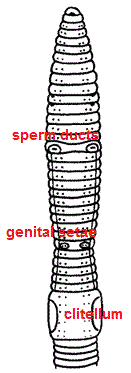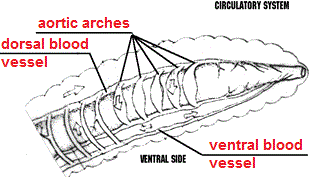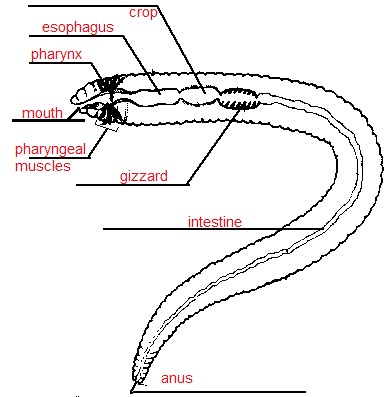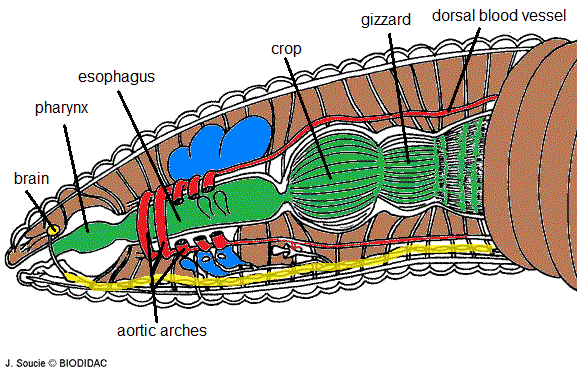Earthworm Anatomy KEY
External Anatomy
Examine your earthworm and determine the
dorsal and ventral sides. Locate the two openings on the ventral surface
of the earthworm ![]()
The openings toward the anterior of the worm are the sperm ducts
The openings near the clitellum are the genital setae. Label them on the worm pictured to the right.
Locate the dark line that runs down the
dorsal side of the worm, this is the dorsal blood vessel. The ventral blood vessel can be seen on the underside of the worm,
though it is usually not as dark. ![]()
Locate the worm's mouth and anus. ![]()
Note the swelling of the earthworm near
its anterior side - this is the clitellum. Label the clitellum.![]()

Internal Anatomy
1. Place the specimen in the dissecting pan DORSAL side up. ![]()
2. Locate the clitellum and insert the tip of
the scissors about 3 cm posterior. ![]()
3. Cut carefully all the way up to the head.
Try to keep the scissors pointed up, and only cut through the skin. ![]()
4. Spread the skin of the worm out, use a teasing
needle to gently tear the septa (little thread like structures that
hold the skin to organs below it) ![]()
5. Place pins in the skin to hold it apart, angle the pins out so that they are not in your way. ![]()
Reproductive System
The first structures you probably see are the seminal vesicles. They are cream colored and located toward the anterior
of the worm. These are used for producing sperm. Use tweezers to remove
these white structures from over the top of the digestive system that lies
underneath it. ![]()
Circulatory system
The dorsal blood vessel appears as a dark
brownish-red vessel running along the intestine. The heart (or aortic
arches) can be found over the esophagus (just posterior to the pharynx).
Carefully tease away the tissues to expose the arches of the heart, the run
across the worm. If you are careful, you can expose all 5 of them. ![]()
The ventral blood vessel is opposite the
dorsal blood vessel, and cannot be seen at this time because the digestive
system covers it.
Label the diagram (use the bold words from above) ![]()
Does the earthworm have a closed or open circulatory system?
________closed________
Digestive System
The digestive system starts at the mouth. You will trace the organs all the way to the anus and identify each on the worm.
Find the mouth opening, the first part after the
mouth is the pharynx, you will see stringy things attached to either side
of the pharynx (pharyngeal muscles) ![]() . The esophagus leads from the pharynx
but you probably won’t be able to see it, since it lies underneath the heart
. The esophagus leads from the pharynx
but you probably won’t be able to see it, since it lies underneath the heart ![]() .
You will find a two structures close to the clitellum. First in the order
is the crop
.
You will find a two structures close to the clitellum. First in the order
is the crop ![]() , followed by the gizzard
, followed by the gizzard ![]() . The gizzard leads to the intestine
. The gizzard leads to the intestine ![]() which is as long as the worm and ends at the anus
which is as long as the worm and ends at the anus ![]() .
.
 Describe the functions
Describe the functions ![]() of each of the organs and
label them on the drawing
of each of the organs and
label them on the drawing ![]() . (The words are listed for you)
. (The words are listed for you)
1. Crop - food storage
2. Mouth - opening for food to enter
3. Pharynx - muscle to suck in food(dirt)
4. Intestine - digestion of food
5. Gizzard - grinding food
6. Anus - where wastes exit
7. Esophagus - tube where food is passed from mouth to crop
8. Pharyngeal Muscles - supports pharynx, sucks in food
*Use your scissors to cut open the crop and the
gizzard. In which organ would you expect the contents to be more ground up. ![]() _gizzard___
_gizzard___
Color the Organ Systems 
For the picture below, color code the organ systems for the earthworm using the following key:
Circulatory System - Red | Reproductive System - Blue | Digestive System - Green | Nervous System - Yellow

